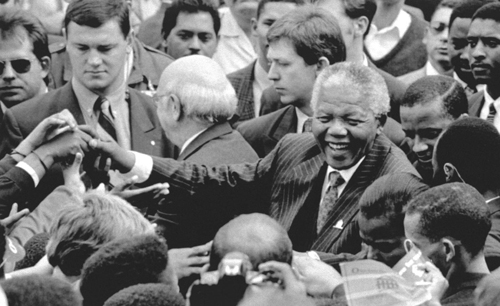|
 |
|
MAN OF THE PEOPLE: Nelson Mandela, then president of South Africa, is surrounded by supporters on May 8, 1996, outside South Africa's Houses of Parliament in Cape Town after the South African parliament passed a new constitution abolishing the country's racial apartheid regime (XINHUA/AP) |
"Bring back Nelson Mandela, bring him back home to Soweto, we want to see him walking down the streets of South Africa … tomorrow ... bring back Nelson Mandela ... "
These are excerpts of a song that was etched in the minds of young people growing up in the late 1980s and early 1990s. From the parched wastelands of Mauritania to the rich minefields of Zaire, and from the mouth of the great Nile, meandering through Sudan, past the savanna of Kenya and Tanzania to Mozambique, the words of the song resonated with the unflinching admiration Africans had for the old man held prisoner on Robben Island—the man who held the continent's hope that South Africa's oppressive apartheid would be crushed.
This song was from the 1988 musical film, Sarafina, a re-enactment of the Soweto Riots, engineered by high school students on the morning of June 16, 1976. The teens rose to oppose policies that sought to wipe out their culture and confine them to the bins of social-cultural inferiority.
African message
Hundreds were killed but their courage sent a message to Africa and the world. In the film, the will to withstand bullets and humiliation is summed up by the lead actress Leleti Khumalo. She wakes up at dawn, stares at a picture of Nelson Mandela on the wall and simply says, "Good morning Nelson," in the same manner one might address the gods or saints for intercession.
Sarafina, through music, brought Mandela into the living rooms and minds of young Africans outside South Africa, who were perhaps ignorant, too young and unaware, or had not yet grasped the gravity of apartheid. With it came the name, the face and fist in the air, Mandela—fondly known by all in Africa as Tata Madiba (Father Madiba).
To adults across Africa though, Madiba was in their thoughts as they went about their lives. In Kenya and across East Africa, men donned the Mandela hairstyle, the stylish parting of hair at the front. They named their children after him, and when one wanted to brag about his strong will and courage over a calabash of village beer, he simply shouted, "I am a Nelson." Dating teens in township alleys and grazing fields could be heard dropping lines, "I am a Nelson; could you be my Winnie?" (Winnie is the name of Mandela's second wife).
The post-independent Africa hobbled from one misstep to another. The chinks and honks of independence were fading away as country after country hit its cul-de-sac with political and economic instability. Looking to Mandela's release provided Africans outside South Africa with a great distraction, a fresh ray of hope just like the night before independence.
|
